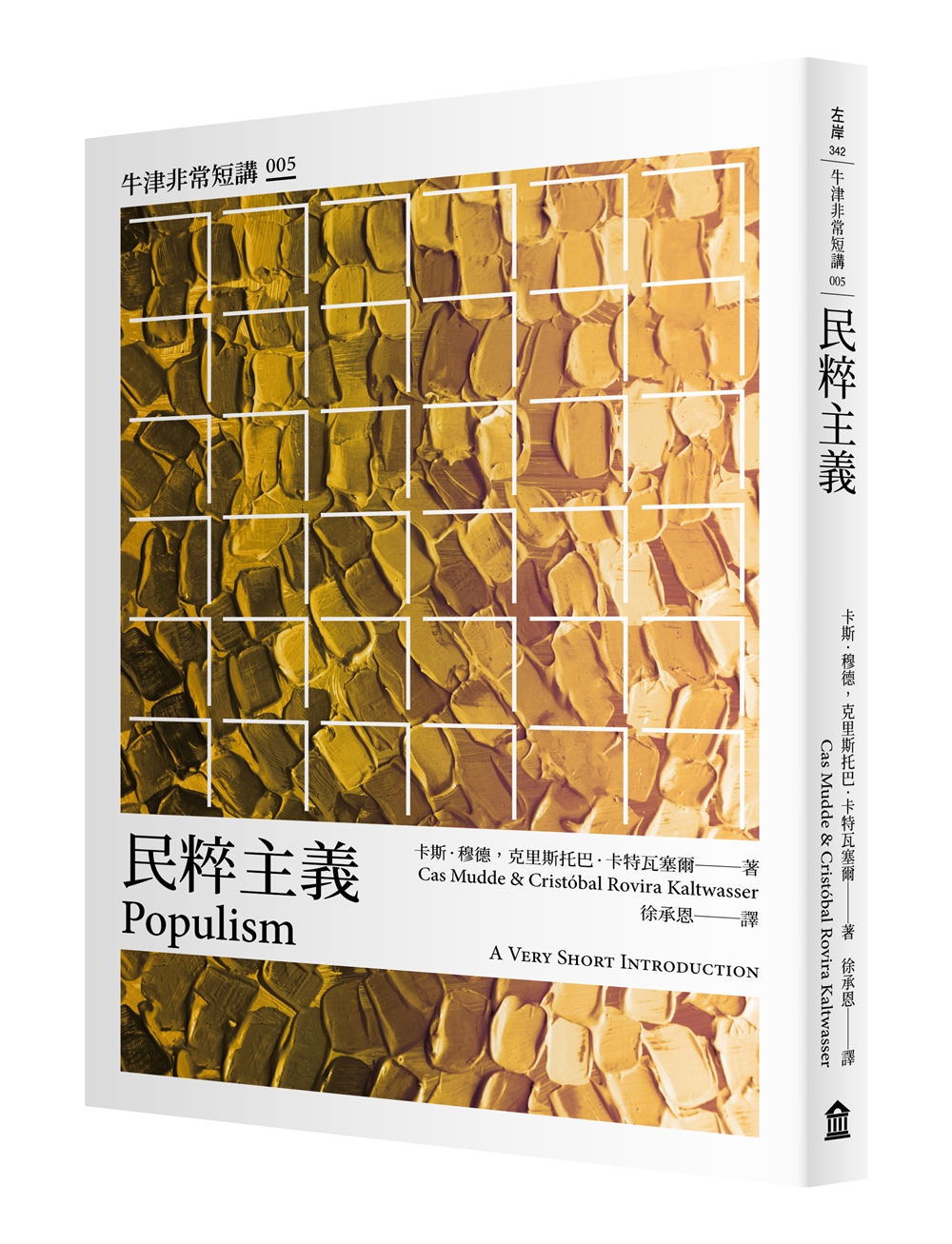79
440348
內容簡介
民粹是當今媒體辯論政治與選舉時的中心思維,然而,就像許多政治學的流行語,這個詞彙的意義不斷地在流動,社會科學家與記者用它來指稱各種不同的現象。到底民粹是什麼?誰是民粹領導人?民粹與民主之間的關係是什麼?本書以一種簡單且具說服力的方式回答了這些問題,並且以理論和實務引領讀者理解何謂民粹。
兩位作者研究民粹已有相當長的時間,他們認為民粹是一種將社會分成兩個敵對陣營的意識形態,這兩個陣營,一方是「純真大眾」,另一方是「腐敗菁英」,這樣的概念將大眾意志凌駕在所有事物之上。透過對現代民粹運動的研究,他們描繪出實踐這種意識形態會產生什麼樣的權力。不管是歐洲的右翼政黨,或是南美的左翼總統們,美國的茶黨運動,都是民粹的代表。作者深入探討這些民粹領導人矛盾的性格,如:阿根廷前總統裴隆(Domingo Peron)、委內瑞拉前總統查維茲(Hugo Chavez)、義大利前總理貝魯斯柯尼(Silvio Berlusconi)…。這些強人代表民粹的主流形式,而許多果斷的女性領導人,如:美國阿拉斯加州前州長莎拉.裴琳(Sarah Palin),她們濫用社會對性別的概念,成功地以民粹吸引一群支持者。
雖然民粹最終是民主的一部份,民粹運動對民主政治的挑戰卻越來越大。比較了不同國家的政治潮流,這本引人入勝的書討論了此種的挑戰將帶來什麼樣的後果,並且解析民粹在當今政治與社會生活中所造成的混亂影響。
Cas Mudde and Cristóbal Rovera Kaltwasser present populism as an ideology that divides society into two antagonistic camps, the "pure people" versus the "corrupt elite," and that privileges the general will of the people above all else. They illustrate the practical power of this ideology through a survey of representative populist movements of the modern era: European right-wing parties, left-wing presidents in Latin America, and the Tea Party movement in the United States. The authors delve into the ambivalent personalities of charismatic populist leaders such as Juan Domingo Péron, H. Ross Perot, Jean-Marie le Pen, Silvio Berlusconi, and Hugo Chávez. If the strong male leader embodies the mainstream form of populism, many resolute women, such as Eva Péron, Pauline Hanson, and Sarah Palin, have also succeeded in building a populist status, often by exploiting gendered notions of society.
Although populism is ultimately part of democracy, populist movements constitute an increasing challenge to democratic politics. Comparing political trends across different countries, this compelling book debates what the long-term consequences of this challenge could be, as it turns the spotlight on the bewildering effect of populism on today's political and social life.
作者介紹
■作者簡介
Cristóbal Rovira Kaltwasser
智利Diego Portales大學政治學副教授,也是Populism in Europe and the Americas: Threat or Corrective for Democracy? 的共同作者。
Cas Mudde
喬治亞大學國際事務副教授,著有Populist Radical Right Parties in Europe,並且與Cristóbal Rovira Kaltwasser共同撰寫Populism in Europe and the Americas: Threat or Corrective for Democracy?
規格
誠品貨碼 / 2681411556003
ISBN13 / 9780190234874
ISBN10 / 0190234873
EAN貨碼 / 9780190234874
頁數 / 136
注音版 / 否
裝訂 / P:平裝
語言 / 3:英文
尺寸 / 17.4X11.1CM
級別 / N:無
退貨說明
退貨須知:
- 依照消費者保護法的規定,您享有商品貨到次日起七天猶豫期(含例假日)的權益(請注意!猶豫期非試用期),辦理退貨之商品必須是全新狀態(不得有刮傷、破損、受潮)且需完整(包含全部商品、配件、原廠內外包裝、贈品及所有附隨文件或資料的完整性等)。
- 請您以送貨廠商使用之包裝紙箱將退貨商品包裝妥當,若原紙箱已遺失,請另使用其他紙箱包覆於商品原廠包裝之外,切勿直接於原廠包裝上黏貼紙張或書寫文字。若原廠包裝損毀將可能被認定為已逾越檢查商品之必要程度,本公司得依毀損程度扣除回復原狀必要費用(整新費)後退費;請您先確認商品正確、外觀可接受,再行拆封,以免影響您的權利;若為產品瑕疵,本公司接受退貨。
依「通訊交易解除權合理例外情事適用準則」,下列商品不適用七日猶豫期,除產品本身有瑕疵外,不接受退貨:
- 易於腐敗、保存期限較短或解約時即將逾期。(如:生鮮蔬果、乳製品、冷凍冷藏食材、蛋糕)
- 依消費者要求所為之客製化給付。(如:客製印章、鋼筆刻字)
- 報紙、期刊或雜誌。
- 經消費者拆封之影音商品或電腦軟體。
- 非以有形媒介提供之數位內容或一經提供即為完成之線上服務,經消費者事先同意始提供。(如:電子書)
- 已拆封之個人衛生用品。(如:內衣褲、襪類、褲襪、刮鬍刀、除毛刀等貼身用品)
- 國際航空客運服務。
若您退貨時有下列情形,可能被認定已逾越檢查商品之必要程度而須負擔為回復原狀必要費用(整新費),或影響您的退貨權利,請您在拆封前決定是否要退貨:
- 以數位或電磁紀錄形式儲存或著作權相關之商品(包含但不限於CD、VCD、DVD、電腦軟體等) 包裝已拆封者(除運送用之包裝以外)。
- 耗材(包含但不限於墨水匣、碳粉匣、紙張、筆類墨水、清潔劑補充包等)之商品包裝已拆封者(除運送用之包裝以外)。
- 衣飾鞋類/寢具/織品(包含但不限於衣褲、鞋子、襪子、泳裝、床單、被套、填充玩具)或之商品缺件(含購買商品、附件、內外包裝、贈品等)或經剪標或下水或商品有不可回復之髒污或磨損痕跡。
- 食品、美容/保養用品、內衣褲等消耗性或個人衛生用品、商品銷售頁面上特別載明之商品已拆封者(除運送用之包裝外一切包裝、包括但不限於瓶蓋、封口、封膜等接觸商品內容之包裝部分)或已非全新狀態(外觀有刮傷、破損、受潮等)與包裝不完整(缺少商品、附件、原廠外盒、保護袋、配件紙箱、保麗龍、隨貨文件、贈品等)。
- 家電、3C、畫作、電子閱讀器等商品,除商品本身有瑕疵外,退回之商品已拆封(除運送用之包裝外一切包裝、包括但不限於封膜等接觸商品內容之包裝部分、移除封條、拆除吊牌、拆除貼膠或標籤等情形)或已非全新狀態(外觀有刮傷、破損、受潮等)與包裝不完整(缺少商品、附件、原廠外盒、保護袋、配件紙箱、保麗龍、隨貨文件、贈品等)。
- 退貨程序請參閱【客服專區→常見問題→誠品線上退貨退款】之說明。
付款/配送





